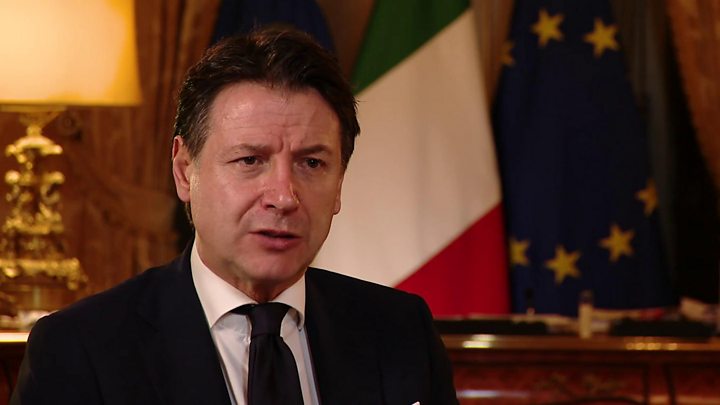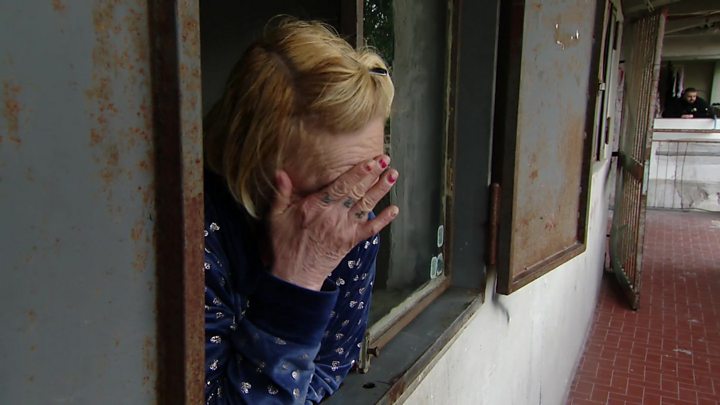When Covid-19 came to Europe it was Italy that was hit first - and hit hard.
Little help came from its European neighbours in those first weeks in February and March, as hospitals in the north were overwhelmed.
As Italy counts its 31,000 dead, concern is mounting over the economic impact too, and there are signs of a rise in the number of Italians losing faith in the EU.
The Treaty of Rome launched the then European Economic Community in 1957, with Italy a founding member.
"I have changed my mind a little on Europe. We are facing an absolute emergency, and seeing countries turning their backs on each other is really awkward," says Rome real estate agent Marco Tondo, 34.
He is currently receiving nine weeks' redundancy pay from the government at 80% of his normal salary.
According to a survey of 1,000 Italians conducted in April by Tecné, 42% of respondents said they would leave the EU, up from 26% in November 2018.
However, a quarter of that number said they would be prepared to stay in the bloc if Europe approved concrete measures for Italy.
Italy went on full lockdown on 8 March and tight restrictions on life were only relaxed on 4 May.
The country's economic output will fall by 8% this year, according to the government of Giuseppe Conte. That scale of downturn will bloat Italy's public debt this year to the tune of almost 155.7% of GDP, Italy's National Institute of Statistics forecasts.
How has Europe responded?
When the health crisis broke out, Mr Conte called for the creation of coronabonds, which would have been underwritten by all eurozone members to share the burden of economic recovery.
But within days Germany and the Netherlands had ruled out any kind of debt mutualisation. That didn't go down well in Italy. Critics said the prime minister had been humiliated in the EU.
"Asking for coronabonds was the perfect way to have the door slammed in his face," argues Carlo Altomonte, associate Professor of Economics of European Integration at Bocconi University.
"Mutualisation of debt is forbidden by EU treaties and Germany's constitution. I think Conte used it as a weapon in negotiations."

Media playback is unsupported on your device
On 18 March, the European Central Bank launched a €750bn (£660bn; $800bn) bond purchase programme to help the eurozone's more indebted countries by pushing down borrowing costs.
Two days later, the European Commission announced the suspension of rules on public deficits, thus allowing countries to inject as much money as they needed into their economies.
Then, on 8 April, the Eurogroup of eurozone finance ministers agreed on a €540bn rescue plan. It was made up of:
- €200bn as a new credit line for companies, provided by the European Investment Bank
- €100bn in loans to support temporary unemployment schemes
- €240bn as a credit line provided by the European Stability Mechanism (ESM) to fund eurozone health systems.
The political debate in Italy has focused mostly on that last part of the package. The unpopular ESM is an intergovernmental bailout fund that provided loans to Greece and some other EU countries during the financial crisis and dates back to 2012.
According to the Eurogroup, loans will have interest rates close to 0.1%, but the money will be used only "to support domestic financing of direct and indirect healthcare, cure and prevention-related costs due to the Covid-19 crisis".
How has Italy reacted?
Italy could borrow up to €37bn from the ESM, but has still to decide whether to ask for the loans.
The two parties that make up the technocrat Mr Conte's coalition government have often held contrasting positions on European issues, and that is the case too concerning borrowing from the ESM.
The centre-left Democratic Party backs the idea. But the anti-establishment Five Star Movement has warned the government would collapse if Mr Conte were to tap into the bailout fund.
"The Italian parliament will decide whether or not it is appropriate for Italy to activate it," Mr Conte finally said, after repeatedly refusing to make use of the ESM.

Media playback is unsupported on your device
The main objection is from the far-right League party, which used to be in government but is now in opposition.
"The ESM is not a gift, it's money lent, to be repaid at precise conditions chosen in Brussels and not in Italy," said its leader Matteo Salvini. "We must re-found the EU on new principles and go back to having control over money production. We need to print money," he argued.
How powerful are the Eurosceptics?
Although the League is still Italy's biggest party, its popularity has been decreasing over the last two months, according to a survey by Demopolis.
The League rules two key regions in Italy's north: the industrial powerhouse of Lombardy, and Veneto in the north-east. They were the first regions to record cases of coronavirus. So the party's handling of the Covid-19 crisis has come under close scrutiny.
Mr Salvini appears to have lost support, while his challenger inside the party, Veneto governor Luca Zaia, is becoming increasingly popular.
"They are both Eurosceptic, but Zaia is in charge of managing this crisis in his region, and he is handling it well," explains Piero Ignazi, Professor of Comparative Politics at the University of Bologna.
"In contrast, Salvini represents the opposition at national level, his criticism of the government is not appealing to the people right now."
While Luca Zaia launched large-scale testing of the entire population of the region, Attilio Fontana, governor of Lombardy and one of Mr Salvini's closest allies, chose not to implement the same strategy.
According to recent research published by The Lancet, Veneto's fatality rate of infected people is 6.4%, whereas in Lombardy it is as high as 18.3%.
Will the EU offer more?
Italy's employment rate, one of the lowest in the eurozone, decreased slightly to 58.8% in March from 58.9% in February.
"I'm not a fan of the League, but Europe is proving once more to be useless, so we should leave the EU," says Valentina Rosi, a 45-year-old former Rome shopkeeper who is now unemployed.
What Italy is looking for now from the EU is a recovery plan that looks beyond loans.
The European Parliament is asking for a €2 trillion recovery fund to be built into the EU budget and the European Commission is expected to table proposals shortly. A major part of the next budget is cohesion, aiming to reduce the big wealth gap between member states.
But there are strong divisions among member states - the biggest is whether countries should receive grants or just loans.
Any recovery plan based mainly on grants would be a victory for Mr Conte, and could make a dramatic difference to Italians still undecided on whether to turn their backs on Brussels or not.
Stefano Vergine is a Milan-based journalist and co-author of The Black Book of the League
https://news.google.com/__i/rss/rd/articles/CBMiMGh0dHBzOi8vd3d3LmJiYy5jby51ay9uZXdzL3dvcmxkLWV1cm9wZS01MjY2Njg3MNIBNGh0dHBzOi8vd3d3LmJiYy5jby51ay9uZXdzL2FtcC93b3JsZC1ldXJvcGUtNTI2NjY4NzA?oc=5
2020-05-17 03:50:08Z
52780786646064
Tidak ada komentar:
Posting Komentar